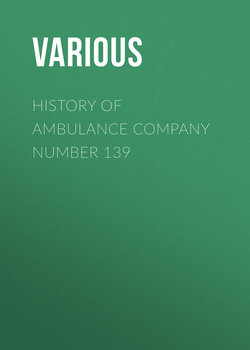Читать книгу History of Ambulance Company Number 139 - Various - Страница 8
FROM SOUTHAMPTON TO LE HAVRE
ОглавлениеOn the dock at Southampton, the British Y. M. C. A. operated a canteen, selling hot coffee, cakes without sugar, and ginger bread made of ginger and water. The supply lasted about fifteen minutes, as we were one hungry bunch.
We boarded the "Archangel," a small passenger boat, about 9 P. M. on the sixth of June. In peace times the "Archangel" was used as a pleasure steamer, but was converted into a troop ship to ply between Southampton and Le Havre. It had three decks, which accommodated about 325 men each. We donned our life-belts, as usual, and tried to make ourselves comfortable, but like all troop ships, that was impossible. The men tried sleeping on deck, but it turned too cold, and they tried below deck. Some were sleeping in the once "state-rooms," but they were too small to accommodate all, so the rest slept in gang-ways, on chairs, benches and barrack bags. We were tired in body but our spirits were high, and we wanted to see the front, so we lay down where we happened to be, using our life-belts as pillows. While pulling out into the harbor, we saw ships in dry dock with large holes in their hulls, others with nothing above water but the masts, all caused by the submarines. And when the little speed demon raised anchor and slipped out of the harbor, we were all fast asleep, never dreaming of what lay before us in France, and not caring a great deal either. We waited in the outside harbor until dark, or about 10 o'clock, and then started our trip across the channel. The boat made very good time, and the trip was uneventful.
At about 7 A. M. we were called to breakfast, which consisted of the customary bully-beef, coffee and hard-tack, and upon coming on deck, we discovered that we were resting safely at one of the big docks of Le Havre. The sun was shining bright and hot, and after unloading and having our pictures taken by a moving picture camera, we were lined up and marched toward the city proper of Le Havre. We were a tired, disappointed bunch of men, for instead of the beautiful country we had expected, we saw a factory infested city. The docks looked more like an arsenal, with cases of ammunition everywhere, and it looked as if the whole French and English armies were working there.
On our march to the rest camp, we passed large bodies of French and Indo-Chinese laborers unloading cars, and conveying merchandise to the warehouses. It was a common sight to see two or three of them pulling a large, two-wheeled cart full of ammunition. We also passed a number of German prisoners working on the roads, with the usual "Poilu" present, with his long rifle and bayonet. It was strange to see the French carrying their guns just opposite to the way the American troops do. We saw many large caliber guns and caissons, that were back from the front for repair, also blocks of salvaged motor trucks.
We marched about five miles to American Rest Camp No. 2, and were put into an old cow-shed to sleep. It was the first billet we had in France, and while it was not the most desirable place in the world to sleep, it looked mighty good to us, as we had not had much rest since leaving Romsey, England.
We were issued meal tickets, and had English tea, war bread and cheese for breakfast, "slum" and war bread for dinner, and English tea and cheese for supper. We had a good night's sleep, but the next morning we were hiked up on a mountain, where we were issued English gas-masks. We went through a gas chamber, to see that the masks were O. K., and to give us confidence in them. About noon trucks were brought up to take us back to camp, and upon arriving there, we were given orders to roll packs and be ready to move. Every one made a trip to the Y. M. C. A. where we could buy our first American cigarettes since coming from the States. We did not know where we were going, or when we could buy more.
